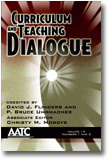
Curriculum and Teaching Dialogue
Vol. 16 # 1 & 2
Edited by:
David J. Flinders, Indiana University
P. Bruce Uhrmacher, University of Denver
Christy M. Moroye, University of Northern Colorado
A volume in the series: Curriculum & Teaching Dialogue. Editor(s): Chara Haeussler Bohan, Georgia State University. John L. Pecore, University of West Florida. Franklin S. Allaire, University of Houston-Downtown.
Published 2014
Curriculum and Teaching Dialogue (CTD) is a publication of the American Association of Teaching and Curriculum (AATC), a national learned society for the scholarly fields of teaching and curriculum. The fields includes those working on the theory, design and evaluation of educational programs at large. University faculty members identified with this field are typically affiliated with the departments of curriculum and instruction, teacher education, educational foundations, elementary education, secondary education, and higher education.
CTD promotes all analytical and interpretive approaches that are appropriate for the scholarly study of teaching and curriculum. In fulfillment of this mission, CTD addresses a range of issues across the broad fields of educational research and policy for all grade levels and types of educational programs.
CONTENTS
Acknowledgments. President’s Message, Barbara Slater Stern. Editor’s Notes: Zombie Ideas Refuse to Die, David J. Flinders. VOLUME 16, NUMBER 1. Presidential Address: The Divorce of Theory and Practice in Public Education: How AATC Can Save the Marriage, Amy L. Masko. Curriculum Theorizing in the Throes of the Audit Culture, Janet L. Miller. The Louisiana Educational Assessment Program: Implications for Students and Schools, Erica DeCuir. Recasting Writing Pedagogy as an Inclusive Practice: Putting Universal Design to Work With 21st Century Composition, Michelle Zoss, Teri Holbrook, and Christi D. Moore. Analyzing the Coherence of Science Curriculum Materials, April L. Gardner, Rodger W. Bybee, Liu Enshan, and Joseph A. Taylor. The Double Edged Sword of Curriculum: How Curriculum in Majority White Suburban High Schools Supports and Hinders the Growth of Students of Color, Thandeka K. Chapman, Tatiana Joseph, Nicholas Hartlep, May Vang, and Talonda Lipsey. The Student as Assemblage of Success: Constructing Multiple Identities amidst Classed, Gendered, and Raced Discourses of Achievement, Limarys Caraballo. Why We Need to Involve our Students in Curriculum Design: Five Arguments for Student Voice, Jeroen Bron and Wiel Veugelers. Digital Progressive Learning Environments for Elementary Children, Kathryn L. Shively. VOLUME 16, NUMBER 2. Editor’s Notes: Zombies in the Midst: Education, Identity, or the Lack Thereof, P. Bruce Uhrmacher. The Intersection of Indigenous Cultures, Visual Arts, and Creative Writing, Kelly A. Hrenko. Preservice Teachers in the Middle Grades: The Benefits of Multiple Multicultural Learning Opportunities in One Teacher Preparation Program, Julie K. Schellen and Kelley M. King. Worthwhile Challenges in the Implementation of Teacher Work Sample, Dana Haraway and Jennifer S. Pease. Liberally Educated Professionals: Searching for Wisdom and Utility in University Curriculum, J. Wesley Null. iCivics Curriculum and The C3 Framework: Seeking Best Practices in Civics Education, Brooke Blevins, Karon LeCompte, Sunny Wells, and Neil Shanks. Teacher Perspectives and Experiences: Using Project-Based Learning with Exceptional and Diverse Students, Katrina A Hovey and Sarah L. Ferguson. A Cross-National Comparative Study of First and Fourth-Grade Math Textbooks Between Korea and the United States, Hyun Kang. The Politics of “21st Century Skills” Pedagogy: Understanding the Dynamics of a New Trend in Adult ESL and its Implications for Practice, Maliheh Vafai. OUTTAKES: Surviving our Livelihoods, Christy M. Moroye. Studying Online Curriculum, Mary Rice. Dissertation as a Challenge Worth Celebrating, Benjamin C. Ingman. Aliens, Zombies and a Volcano, Alison E. Leonard. IN MEMORIAL: Among Elliot W. Eisner’s Contributions to Teaching and Curriculum, Christy M. Moroye, David J. Flinders, and P. Bruce Uhrmarcher. About the Authors.
-
Paperback9781623968069
Web price: $45.04 (Reg. 52.99)
-
Hardcover9781623968076
Web price: $80.74 (Reg. 94.99)
- eBook9781623968083

- EDU000000 - EDUCATION: General
- EDU032000 - EDUCATION: Leadership
- EDU029000 - EDUCATION: TEACHING METHODS & MATERIALS: General
-
 Curriculum and Teaching Dialogue
Volume 24, Numbers 1 & 2, 2022
Curriculum and Teaching Dialogue
Volume 24, Numbers 1 & 2, 2022
-
 Curriculum and Teaching Dialogue
Volume 25, Numbers 1 & 2, 2023
Curriculum and Teaching Dialogue
Volume 25, Numbers 1 & 2, 2023
-
 Curriculum and Teaching Dialogue
Vol. 19 # 1 & 2
Curriculum and Teaching Dialogue
Vol. 19 # 1 & 2
-
 Curriculum and Teaching Dialogue
Vol. 20 # 1 & 2
Curriculum and Teaching Dialogue
Vol. 20 # 1 & 2
-
 Curriculum and Teaching Dialogue
Vol. 21 # 1 & 2
Curriculum and Teaching Dialogue
Vol. 21 # 1 & 2
-
 Curriculum and Teaching Dialogue
Vol. 22 # 1 & 2
Curriculum and Teaching Dialogue
Vol. 22 # 1 & 2
-
 Curriculum and Teaching Dialogue
Vol. 23 # 1 & 2
Curriculum and Teaching Dialogue
Vol. 23 # 1 & 2

